I don't think Shakespeare
ever intended for his private Sonnets to be published, but Thomas
Thorpe got hold of them and printed them in 1609 anyhow. Because there
is no reference to the Sonnets for almost thirty years, I think
Shakespeare suppressed their publication.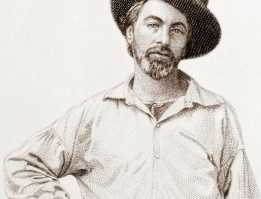
On the other hand, in 1855
Walt Whitman himself paid to have 800
copies of his now-famous Leaves of Grass printed -- long before
self-publishing became fashionable with today's digital printing and the
restrictive policies of corporate publishers. Whitman kept revising his
book, edition after edition, the rest of his life. The first eddition named
no author, and it was in places banned. Critics condemned it as filth (Whitman
was fired from his job) and others praised its originality.
My book has been called "ground-breaking"
because never before have 154 fresh examples of the sonnet form, traditionally
the medium for the exploration of the emotions and circumstances of love,
been placed in a world-wide spiritual context, with so many dimensions
of friendship and sexuality, supported by glosses and other material
for the reader to contemplate and enjoy.
This blog is a record of the
publication of my book, Thanks for Noticing: The Interpretation of Desire,
praised
by many (but Mike Huckabee has not yet seen it), and I hope that you
will help get the word out about this book -- You
can help
My
purpose is not to make money, as those of you who know me are keenly aware,
but to further the idea that sexuality and spirituality are intimately
related, and that the poetic form can chart the journey by which this truth
can be discovered afresh.
So, if you're interested, let's start with a photo
of me that day, Oct 3, 2015, that the printing arrived at my Westport house
in Kansas City, MO. I was not prepared for the Saturday -- I expected it
the following week. I don't know what the photo here shows about how I
was feeling, but I can tell you after decades of writing, collecting, and
then choosing the sonnets for this book, and then seeing the book with
the notes and other material at last in print, and handsomely so, I felt
I was at another turning point in my long career.
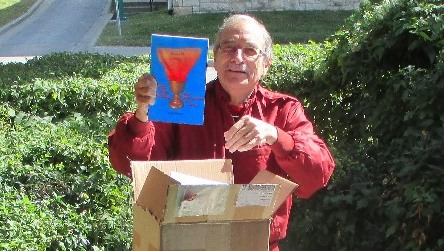
The next day, with citations from my book, I preached
on
"Do Christians Eat Flesh and Drink Blood?" at Rosedale
Congregational-UCC Church, and several of the great folks there asked for
copies of the book.

Then a couple weeks later, Oct 17, my friend John
Gregory hosted a wonderful celebration at his beautiful Hyde Park
house. The weather was perfect:

Following a brass
fanfare, Shakespeare (Matt Rapport) decended on the grand stairway,
Vern gave him a copy of his book, and Shakespeare (you can call me "Will")
read a sonnet from Vern's new book to begin a short program at a private
reception featuring delicious food by Soha El-Sherif, Elizabethan guitar
music by Mac Childs, a setting for one of Vern's sonnets sung by baritone
Matt Richardson, a short discription of the book and a sonnet read by Vern.
John Gregory, host, welcomed everyone, and Jamie Rich announced a public
book launch and signing Nov 16 Monday 7 pm at Unity Temple on the Plaza.
Thanks to Bill Pryor for the photo!
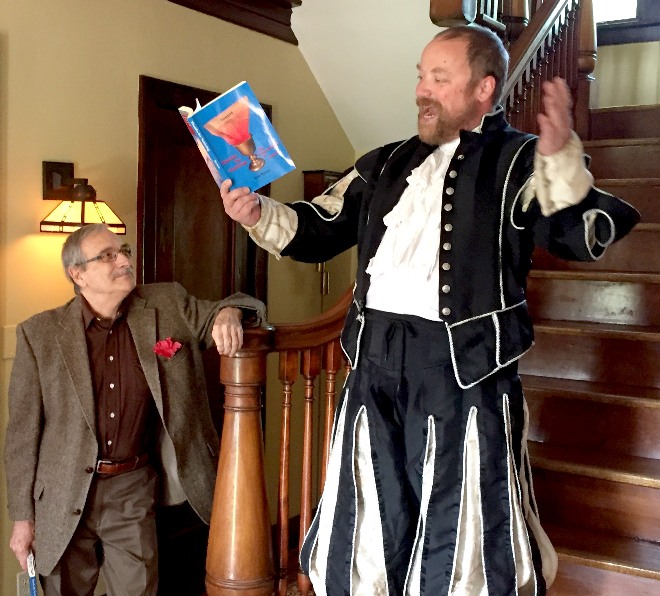
Another view stolen from David Nelson's Facebook page--
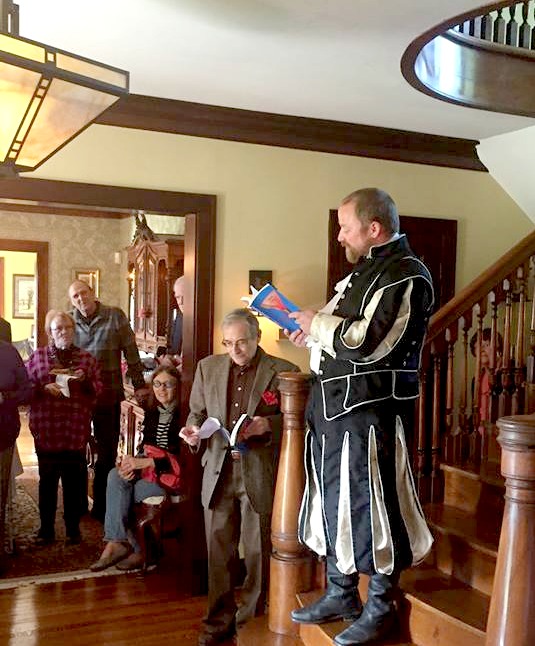
Shakespeare and others insisted I read a sonnet,
but I refused to read the one Shakespeare requested (my #30) because he
had just read his #73, so I read my #24, "Passage."
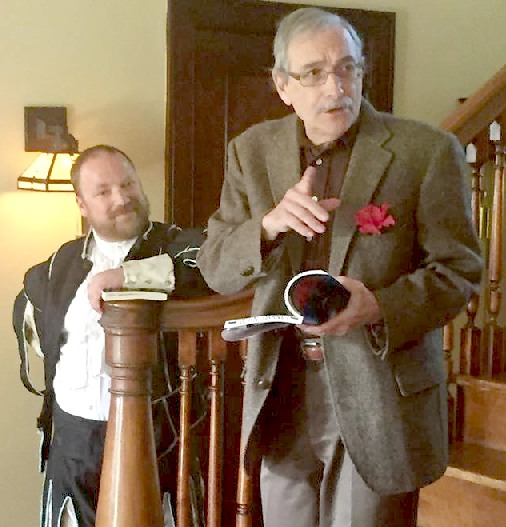
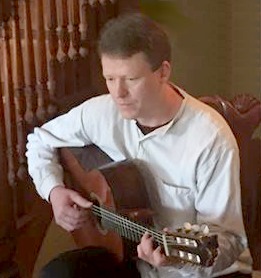 One
of the delights of the occasion was the music of professional guitarist
and teacher Mac Childs who played from Elizabethan and other genres appropriate
to the book. One
of the delights of the occasion was the music of professional guitarist
and teacher Mac Childs who played from Elizabethan and other genres appropriate
to the book. |
The photo below shows Eric Riedel from Minneapolis
and Vern surveying some of the delicacies Soha El-Sherif provided for the
reception.
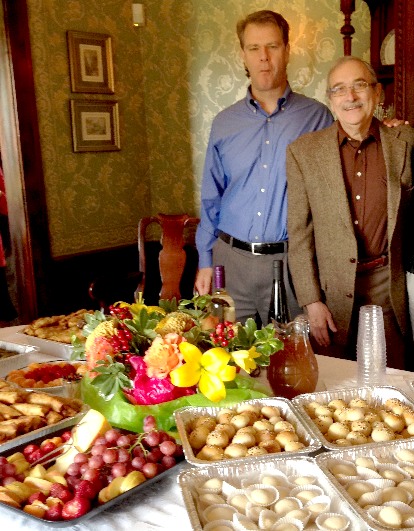
Below is a collage of some of the guests
accidentally captured on a stationary video recorder:
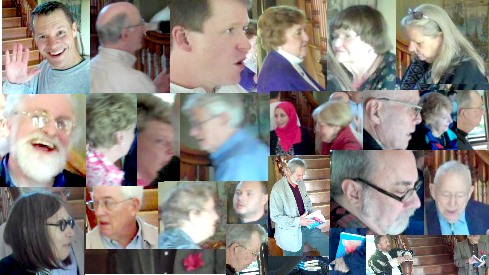
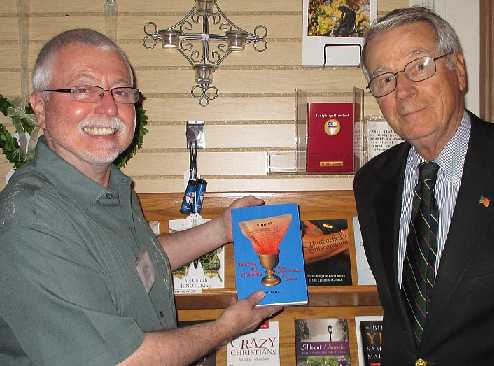 The first book store in Kansas City to carry the book
is the bookshop at Grace and Holy Trinity Cathedral,
the downtown Kansas City, MO Episcopal Cathedral. Here bookstore manager
Ken W Stewart features the book with Larry McMullen who was the first to
purchase the book from this vendor.
The first book store in Kansas City to carry the book
is the bookshop at Grace and Holy Trinity Cathedral,
the downtown Kansas City, MO Episcopal Cathedral. Here bookstore manager
Ken W Stewart features the book with Larry McMullen who was the first to
purchase the book from this vendor.
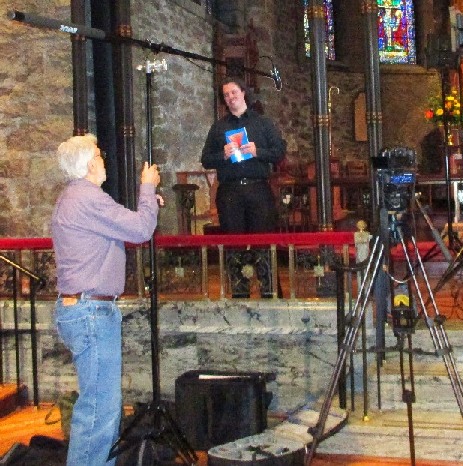 I'm grateful to videographer Bill Pryor for
taping tenor Dr Joseph DeSota at Grace and Holy Trinity Cathedral
2015 October 18 as they prepared a video for YouTube of a musical setting
I wrote for my sonnet "Ad Astra."
I'm grateful to videographer Bill Pryor for
taping tenor Dr Joseph DeSota at Grace and Holy Trinity Cathedral
2015 October 18 as they prepared a video for YouTube of a musical setting
I wrote for my sonnet "Ad Astra."
I almost identified Joey
as a tenor-baritone because of the tune's wide range which he presents
with such grace. Those who know about music more than I have commented
especially about his skill in singing the difficult phrase "like calling
minnow what is whale" and making it sound easy. On
YouTube video 7 Joey sings the entire tune, 2 mnutes 10 seconds. Enjoy!
The tune with text appears
as the Frontispiece of the book, on page 4. The sonnet with notes appears
on page 64.
And thanks to Jamie Rich
whose ideas for getting out the word about the book, including setting
up this taping, have been so valuable. |
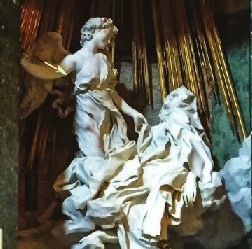
Actually, I should back up a bit because an article
I wrote for the Episcopal Diocesan magazine, SPIRIT
(you can download a PDF by clicking here) had just been published in
August, entitled, "Yearing in Flesh and Spirit," which outlines a theme
of my book.
This is a detail of a wonderful
photo the editor included, St Teresa in Ecstasy, the amazing sculpture
by Bernini, based on her autobiohgraphy where she describes in orgasmic
terms the visitation of the spirit, the angel (a Christian version of Cupid)
thrusting his arrow into her innermost being.
|
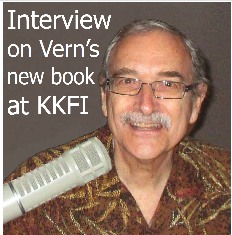
|

Also before the book was in print, Philip
Hooser, long time Kansas City theater power (actor, writer, producer, director,
educator) interviewed me 2015 Sept 5 about the about the then-forthcoming
book on KKFI.
|

Although we have not yet officially launched the
book locally, much less nationally, we received a paid order for
the book from Washington, DC October 29 and posted the book the same day.
From Japan, my Shinto-priest
friend who was my roommate at the University of Chicago writes me that
his copy of the book has arrived and he first offered it at his family
altar. I write back that I am grateful to him for recoginizing the sacred
intent of the book.
Then he wrote again and enlarged his comment: "As
soon as I receive particularly something very valuable, very important,
and meaningful, I offer it to my family altar to let Kami and spirits of
my ancestors see it. But the altar tends to be a storeroom. which is like
a safe. If a robber enters my house, he should first go to the altar; he
can steel various precious items of mine.
After offering your book to my family altar, the
first sonnet which I read is the sonnet on page 69. When I read the footnote
of that page, I found a very accurate description of the core of our religious
faith. This description is A+++."
The formal public Book Launch 2015 Nov 16 Monday
7pm at Unity Temple on the Plaza was announced with this filer --
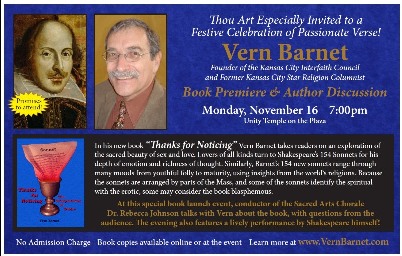
The text reads, in part, --
Thou Art Especially Imvited to Festive
Celebration
of Passionate Verse!
Vern Barnet, founder of the Kansas City Interfaith
Council
and former Kansas City Star religion columnist
In his new book Thanks for Noticing Vern Barnet takes
readers on an exploration of the sacred beauty of sex and love. Lovers
of all kinds turn to Shakespeare's Sonnets for his depth of emotion
and richness of thought. Similarly, Barnet's 154 new sonnets range through
many moods from youthful folly to maturity, using insights from the world's
religions. Because the sonnets are arranged by parts of the Mass,
and some of the sonnets identity the spiritual with the erotic, some many
consider the book blasphemous.
At this special event,
conductor of the Sacred Arts Chorale Dr Rebecca Johnson talks with
Vern about the book, with questions from the audience. The evening also
features a lively performance by Shakespeare himself!
See below for photos from the event.
Vern's area Unitarian Universalist ministerial colleagues,
at the end of their meeting in Topeka 2015 Nov 5, asked about the book,
and all present (and one present by Skype) purchased copies.
On 2015 Nov 6, Vern spoke on Yearning in Flesh
and Spirit at a luncheon meeting of the Professional's Club, and a
number of members bought books after his remarks.
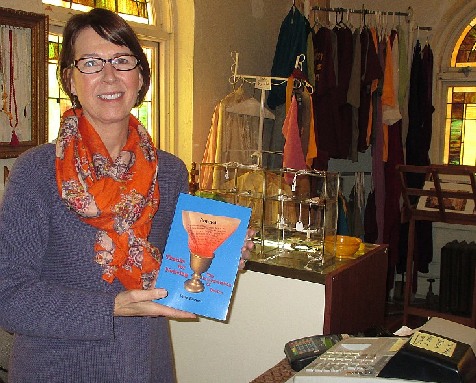
Vern's book is now available at the bookstore at
the Rime Budddhist Center. Following Vern's talk, Can a Buddhist Have
Desires?, and book-signing 2015 Nov 8, Stephanie Shirazi, behind the
register, holds one of the remaining copies.
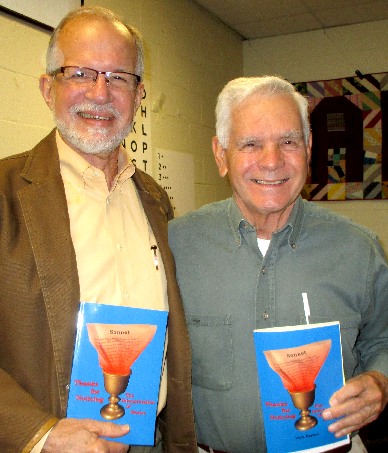
Cliff and Gerry, two of the regulars at David Nelson's
monthly Vital Conversations, hold their copies of the book which was the
subject of discussion 2015 Nov 11.
The online and print versions of The Kansas City
Star for 2015 Nov 14 noted the Public Book Launch:

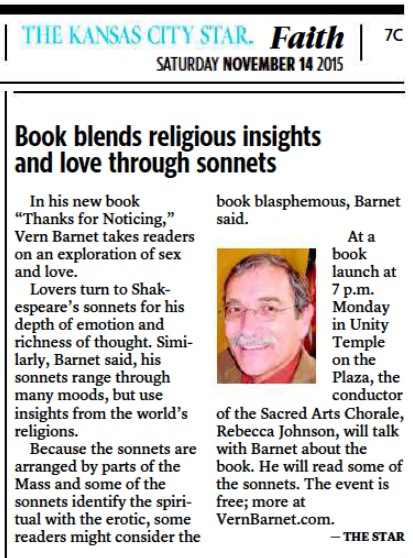
The Cornerstone Foundation presented an
Author discussion and book signing
of
Vern's new
book, Thanks for Noticing
-- Nov 16
Mon 7 pm Free Event--
Unity Temple
on the Plaza
707 W 47th St, Kansas City,
MO 64112 (816) 561-4466
Free garage parking

With guest appearance
(after 400 years) of
Mr William Shakespeare
and moderator Dr Rebecca Johnson,
Vern discussed his
ground-breaking
book on love, sex, and spirituality
in the context of world religions
and signed books after audience
Q and A.
AT THE PUBLIC BOOK LAUNCH
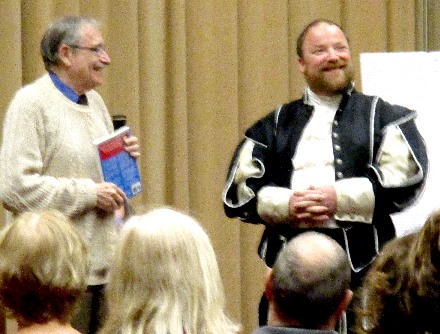
Mr William Shakespeare
(Matt Rapport from the Heart of America Shakespeare Festival) glories
in the audience applause as he appeared at the official public book launch
2015 Nov 16 at Unity Temple on the Plaza. He read the opening sonnet in
Vern's book and pronounced it worthy.
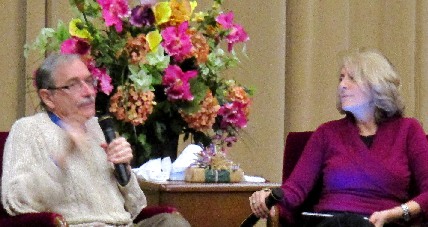
Then Dr Rebecca Johnson,
director of the Sacred Arts Chorale, interviewed Vern about the book with
many interesting questions. The formal program concluded with questions
from the audience, and afterwards Vern visited with guests and autographed
their books.
$40 A COPY
The list/cover price of
the book is $16.95. Some places are discounting it to $16.00. CRES charges
$16.95 ($12 students/low income) but offers free
mailing.
The first time someone
insisted on paying $40 for a copy I was stunned. But on Thanksgiving Day
a second person bought a copy directly from me for $40. I think I could
get used to this.
Since then someone sent
me $100 for a single copy.
A MASTERPIECE
Dear Vern,
Congratulations on creating a masterpiece!
I read your book with increasing wonder and appreciation. It is better
than therapy, as it analyzes sexual-spiritual yearning more thoroughly
than any of the therapists with whom I tried to discuss this persistent,
insistent, overwhelming issue in my early adult life (age 16 to 45).
In fact, therapists actually refused to directly discuss the topic.
Instead they would redirect my focus to what they considered to be "reality."
During
those years I had been writing poetry, but after therapy I ceased to do
so as I felt it was too self-indulgent. In fact the last line of
my last poem was this question: "is poetry sublime or merely masturbation
of the mind?"
Thank you for your inspiration and courage!
--With permission,
withholding name
Greater Kansas City area
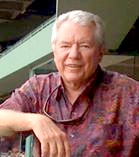 DAILY
PRACTICE DAILY
PRACTICE
I am really enjoying reading
my friend Vern Barnet's new book Thanks for Noticing. I am
reading and reflecting on one sonnet every day. Reading the sonnet, the
epigraphs, and footnotes is like taking an interdisciplinary course on
world religion, liturgy, spirituality and sexuality. Often the thoughts
stay with me throughout the day and I return to the sonnet at day's end.
I have know Vern for several decades and continue to be amazed with his
wisdom, insights, and ability to invite me to grow in understanding and
appreciation of the human agenda.
I just watched the YouTube
video of Vern reading the Opening Sonnet. It is great. I just
posted a link on Facebook and already have a couple of "likes."
--The Rev
David E Nelson, DMin
president, The Human Agenda
Gladstone, MO
|
YOUTUBE
Enjoyed the you tube link.....very
nice and professionally done. Congrats!!
John Gregory
Kansas City, MO
 VERN
ROMANTIC F***ER MYSTIC VERN
ROMANTIC F***ER MYSTIC
Very interesting web page,
blog, and offer. Impressive. As is your wonderful book. I go through it
slowly, only a couple at a time, savoring this essential Vern, romantic
f***er mystic.
--The Rev
Brad Carrier,
Ashland, OR
|
SEX
IS THE KEY
 from
Comment added to YouTube video from
Comment added to YouTube video
Dear Vern:
Like most ministers I know, I have struggled with being honest about this.
In my a book of poetry I wrote, SEX IS THE KEY TO LIFE ITSELF AND
LOVE IS THE KEY TO LIVING. AND IF YOU WOULD A TRUE LOVE FIND,
SEARCH WITH THE HEART AS WELL AS MIND.
As I know postage to England costs a good bit more, my credit card payment
is more than you asked.
Love, and a prayer for peace in the Middle East.
--Richard
Boeke
Horsham, West Sussex,
United Kingdom
|
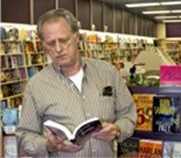 PULITZER
PRIZE PULITZER
PRIZE
Perhaps no more than ten or
twelve people might read Thanks for Noticing all the way through
and really understand it all, but if it's the right ten sets of eyes, it
could win a Pulitzer Prize for poetry. It really is that good.
--Mark Scheel,
editor, writer, and former library
information specialist. His 1997 book, A Backward View: Stories and
Poems, was chosen for the J. Donald Coffin Memorial Book Award. His
latest book is The Pebble: Life Love, Politics and Geezer Wisdom. |
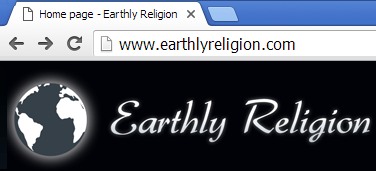 |
Byron Bradley
(Byrd) Carrier
Ashland, OR
January 7, 2016
|
Reviewing
Vern’s Sonnets: Thanks for Noticing
I wouldn’t have read Thanks for Noticing: The
Interpretation of Desire by the Reverend Doctor Vern Barnet were
he not my friend from seminary. Vern was a bold visionary, too much for
the staid faculty at our University of Chicago seminary, Meadville/Lombard.
His three-volume D. Min. thesis on The Void may have perplexed and overwhelmed
them. True to his brilliant mind and audacious quirks, he brings his encyclopedic
knowledge of trans-cultural mytho-religious facts into his penchant to
link the sacred and the sexual.
I’m impatient with poetry, especially sonnets. The
odd phrasing and obscure words have to be dwelt upon slowly and repeatedly
to tease out their gifts. Then the “Aha!” comes. Then the bemused smile
fills the inner face via some pun or double-meaning. Then we share in his
passion for passion – sexual and religious. For the reverend doctor, these
two are not opposites; these play in union, each fulfilling the other.
For instance, in “Holy Words” he considers a friend’s
caution to back off from the sexual side in his religious poem:
I want an honest, open world, so I
must keep the holy law to consecrate:
my friends and every form of love I try,
each sacred chance, some fleshy, gay and straight.
From shame and shade these sonnets seek to pluck
such ancient holy words as “love” and “fuck.”
For Vern, a great sin is the expulsion of sex from
spirituality. He goes round the world and back through time to gather wider,
wilder humane advice. Some he puts in his sonnets (which he recommends
we read aloud to pull out their rime, meter, and meaning) and some in the
interesting facts he provides at the bottom of each page. For instance,
he finds Father Matthew Fox quoting Richard Rohr, “Of all the world’s religions,
Christianity has the biggest bias against the body. This is a disastrous
theology. If I were Satan, and if I wanted to destroy Christianity, I would
work overtime to tempt Christians to hate the flesh.” (Pg. 192)
In “The Cosmic Christ” Vern puts it in the positive:
The world entire is Christ, distressed,
alone,
a way of painting all we see and know,
the damned, the saved enjoined with laugh and
moan,
a metaphor chamfering loved and foe.
So I’ll be hurt to heal, be bound to free,
change ache to kiss and wrench eternity.
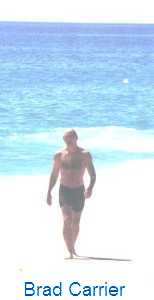 In
a note at the bottom of a poem he writes: “God’s playful delight is to
behold us, to know us as we are, beyond human moral criteria. Similarly,
when we love without need, intention, agenda, compulsion, claim, judgment,
or dependency, but simply love by noticing, by witnessing, by beholding,
loving freely as God does, we become like God. (Pg. 101) In
a note at the bottom of a poem he writes: “God’s playful delight is to
behold us, to know us as we are, beyond human moral criteria. Similarly,
when we love without need, intention, agenda, compulsion, claim, judgment,
or dependency, but simply love by noticing, by witnessing, by beholding,
loving freely as God does, we become like God. (Pg. 101)
This reminds me of a poem he used to use in his
liturgies: “We are God, and eternally we rejoice and moan; the freedom
scares us, the responsibility is immense.” Vern has lived into his freedom
and up to his responsibility, and I’ve noticed.
Do you like words and word-craft, far-flung theology,
unusual facts and bold sex-positive affirmations? Do you like sonnets and
Shakespeare? Can you read his gay stance into your preferred attraction?
Then notice how opening his sonnets opens you. He’d like that.
--Brad Carrier
Ashland, OR
|
|
Sonnet
11 "Kitchen Cockroach"
I've just begun reading Vern's
sonnets and I have to say that, among the many laudable aspects of his
poetic style, what I find most intriguing is his ability to imbue mundane,
oft overlooked moments in daily life -- a cockroach loafing in the kitchen
unaware of its impending immolation -- with a sense of cosmic importance,
philosophical profundity, even. This effect is as charming as it is existentially
troubling for the unsuspecting reader who, upon reading "Kitchen Cockroach,"
for example, finds himself rooting for the death of the cockroach right
up until the moment he realizes that by merely adjusting the magnitude,
he too is a cockroach in the eyes of the universe.
This poem is a meditation
on something so simple, yet so remarkable: a higher life form destroys
a lower one, or, after billions of years of violent expansion, the universe
coalesces into two distinct beings, man and cockroach, in order to comprehend
what it means to sacrifice and to be sacrificed in the same instant. One
action does not cause the other, they are dependent on one another for
the continuity of the universe. We are left wondering, as Vern puts it,
"Is this fire hate / or love . . ." or is it something distinct altogether?
If this poem is any indication
of what's to come in the rest of the volume, then I have no doubt that
Thanks
for Noticing will prove to be a worthy read!
Philip Noonan
Boston
|
THE FOOTNOTES
The footnotes are themselves
worth the price of the book! And they are on the same page as the sonnet
so you don't have to fumble in the back of the book looking for them.
--Jerry Grabher
Kansas City, MO
Sonnet
84 "Postmodern Faith -- What is Truth?"
Is the earth 6,000 years old?
Or is it 10,000? Who cares facts? A talking snake in the Garden of Eden?
Who cares facts? My friends tell me that the Bible is the truth, the actual
truth. But who cares facts? Evolution true? Global warming real?
Irrelevant. Who cares facts? Thinking of stepping on ice that is a quarter
of an inch thick? You might care facts. The Incans, Aztecs, Mayans and
others engaged in sacred, ritual sacrifice of human beings, including children,
as part of their faith that such acts would insure the fertility of the
crops, ward off evil, and nourish and propitiate the gods, among other
things. (You have stated in your commentary that worship is the enactment
of myth, and ritual is a form of sacred play. Some kind of sacred play
here!) But such worship cannot fail. And the Inquisition? Thousands of
heretics burned at the stake to rid the world of evil. (Worship cannot
fail.) For the sake of one Truth? One Truth with a capital T is not postmodern,
but fundamentalist. I have a friend and I have relatives who believe that
I am going to hell. They worship a God that is going to send me there.
Their worship cannot fail? Really? It would be hard to find a question
more absurd or dangerous than the last line of this sonnet.
--Ron Ruhnke
St Joseph, MO
Sonnet
124 "Destiny"
I appreciate the beauty and
sensuality of the piece. Descriptions are specific and clear. I find them
exciting. I am there.
As a person who identifies
as atheist, I reject what feels to me a need/desire for some diety's approval.
I believe I understand the author's intent to blend the sexual with the
divine, and in that sense, the objective is met. I, personally, stand with
the men in the joy of their sexuality aside from a diety. Celebrate it!
It's wonderful!
--M K Mustard
Lake Lotawana, MO
Sonnet
101 "Jesus Would Have Loved This Man"
Vern, I was touched by #101.
Yes, we are all against sex trafficking and the ugly side of the exploitation
of women. But I know that for many men, perhaps women, too, for whom
there is great loneliness in not being able to have a partner or connect
intimately with another human being.
More important than just sex
is to be able to have a conversation with another person, even if you pay
for it. I see one of our important ministries the will to engage those
who have no one to love or care for them. Particularly elderly men with
no close family or little in the way of friends.
I've always believed that,
when you walk into an elevator, a kind greeting to the other person standing
there may be the only time that day someone spoke to them. You just
never know.
--With permission,
withholding name
Kansas City, MO
Thanks
for Noticing: The Interpretation of Desire
"Vern Barnet is to sonnets
what Robert Mapplethorpe is to photography."
--Ryan Gates
musician and composer
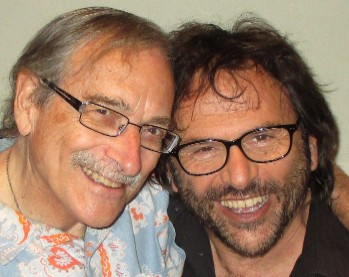
"I read a sonnet every night as a devotional practice."
--Phil Kenin
actor
director
playright
teacher.
photo of Vern and Phil taken at a rehearsal of the
Heartland Men's Chorus |
|
OPENED UP DISCUSSIONS
ABOUT LOVE, SEXUALITY . . .
I've been in ecstasies of
delight while reading your sonnets! I can't express how much enjoyment
I'm getting from them. Thank you!
One experience that I wanted to say thank you for came from a sonnet of
yours was with my [relative]. [Name] is in [his/her] early twenties and
has experienced some sexual abuse and has some anger and confusion, partly
from the experience, and partly from being simply young - and therefore,
quite predictably angry and confused!
Name has not experienced the empathy [he/she] needs from [his/her] parents
and other adults, and has sadly drawn the conclusion that all religious
people would view [his/her] heart-wrenching pain and honest questions negatively.
I asked [name] if I could read some of your sonnets aloud in the presence
of [him/her] and [other young people]. They opened up great discussions
about love, sexuality, spirituality and interfaith dialogue over several
days. My [relative] was in a state of marvel! Your poetry and the following
discussions opened many new possibilities with [him/her], and gave [the
other young people] and me an avenue to squeeze a little more empathy into
[his/her] life, which [he/she] desperately needs. Thank you! —WITH
PERMISSION |
 Postal
receipt from mailing our first order from the United Kingdom. Postal
receipt from mailing our first order from the United Kingdom. |
The Kansas City Public Library now, 2016 Feb 1,
has two copies of the book in its collection. Click on the image for the
full entry.
http://catalog.kclibrary.org/client/en_US/kclibrary/search/detailnonmodal/ent:$002f$002fSD_ILS$002f0$002-
fSD_ILS:2540285/ada;jsessionid=3E4CAC203B55E364B7B997663995EC04.-
enterprise-12000?qu=vern+barnet?lm=KC_ALL
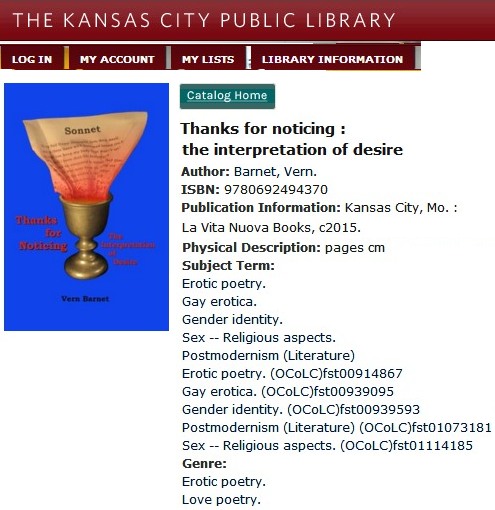
ORIGINAL ANNOUNCEMENT:
Lovers of all sorts
turn to Shakespeare’s sonnets for their depth of emotion and the richness
of their ideas. But did Shakespeare try to suppress the publication of
his sonnets in 1609?
Vern Barnet, former religion writer for The Kansas City Star and author
of Thanks for Noticing, a collection of his own sonnets, discusses
the sonnet form of poetry, how the sonnet in English is practically identified
with Shakespeare’s genius, and explores the meaning of Shakespeare’s sonnets
for us today.
Vern welcomes questions about Shakespeare and about his own book which
will be available for sale and signing after the program, or you
can purchase it ahead of time.
Vern's bio.
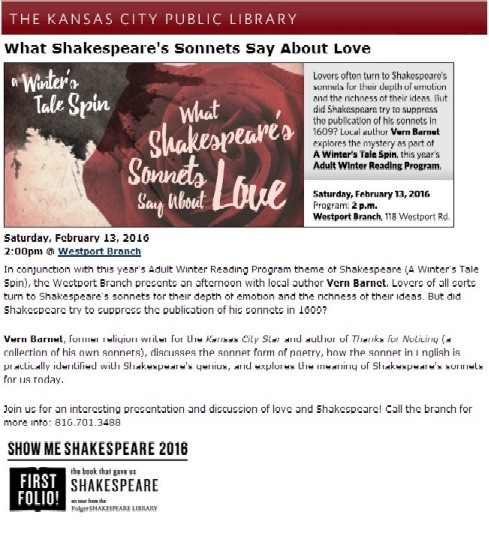
Unwrapping
the Secrets of the Immortal Poems:
What Shakespeare’s
Sonnets
Say About Love
For Valentine's Day
2016 February 13 Saturday 2 pm
Kansas
City Public Library Program, Westport Branch
118 Westport Road, Kansas City, MO
64111, 816-701-3488
FACEBOOK: https://www.facebook.com/ThanksForNoticingBook/
See the Report by David
Nelson below.
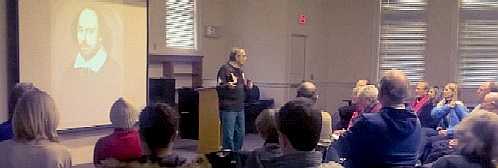
Photo: Geneva Blackmur
Click for more FACEBOOK
photos
The Kansas City Public Library Westport Branch presented
Vern in an interactive lecture on lecturing Shakespeare's Sonnets. Vern
noted that "Lovers of all sorts turn to Shakespeare’s sonnets for their
depth of emotion and the richness of their ideas" and asked, " But did
Shakespeare try to suppress the publication of his sonnets in 1609?"
Vern Barnet, former religion
writer for The Kansas City Star and author of Thanks for Noticing,
a collection of his own sonnets, discussed the sonnet form of poetry, how
the sonnet in English is practically identified with Shakespeare’s genius,
and explored the meaning of Shakespeare’s sonnets for us today.
Vern Barnet
studied with U.S. Poet Laureate and Pulitzer Prize winner Karl Shapiro
at the University of Nebraska before completing his doctoral studies at
the University of Chicago. In addition to The Star, his essays, reviews,
and poems have been published in the National Catholic Reporter, the Chicago
Literary Review, and various religious magazines and literary journals.
He was one of the editors for the 740-page reference book, The Essential
Guide to Religious Traditions and Spirituality for Health Care Providers
(2013). He founded the Greater Kansas City Interfaith Council in 1989 and
remains active in interfaith work. He has taught at area seminaries, is
a frequent lecturer at area churches, and has appeared on local and national
radio and television.
For advanced
reading, Vern hadsuggested:
Helen Vendler: The Art of Shakespeare's
Sonnets -
Stephen Booth, editor: Shakespeare’s
Sonnets.
Harold Bloom: Shakespeare's Sonnets
William Shakespeare, Oscar Wilde,
Edward Hubler: The Riddle of Shakespeare's Sonnets
#160213DEN
R E P O R T
Vern gave the crowd at the Westport
Branch Library a Valentine’s Day gift by unwrapping the secrets of William
Shakespeare’s 154 Sonnetsof love. From my recollection and a copy
of Vern's notes, I want to tell you about the February 13 presentation.
Citing the Introduction
to his own book of 154 sonnets, Vern said that watching him walk across
the room would not be very interesting. But if a ballet dancer or a gymnast
went from one wall to the other, it might be quite thrilling. Vern promised
a pedestrian summary of what Shakespeare’s Sonnets say about love
at the end of the program, but first we would thrill to the poetic dance
and gymnastics of the Sonnets.
He began with the most
famous love sonnet, 116, and played several of the 300-some YouTube videos
of folks reciting that sonnet, from a 6-year old boy to a professional
actor. Then he asked us all to stand, and together we read the sonnet.
It was a wonderful new experience! Vern contended that this familiar sonnet
beginning, ‘Let me not to the marriage of true minds / admit impediments”
is not meant as a definition of love but is actually part of an argument
Shakespeare had with his beloved.
Vern presented a time-line
of Shakespeare’s life and the view of many scholars about the identity
of the young man to whom Shakespeare wrote, and a plausible speculation
about how Shakespeare was commissioned to write sonnets to urge the young
nobleman to marry and beget a son. Then Shakespeare himself fell in love
with him. This led Vern to offer evidence that Shakespeare did not want
the sonnets published.
I enjoyed learning
more about what a sonnet is, and how within that strict form Shakespeare
invented varied internal patterns. We also learned a bit about the pronunciation
of English at that time. For example, in Sonnet 18, which follows the seventeen
“procreation” sonnets, the word “lines” in line 12, which puns both the
poetic line and the genealogical line, was pronounced to sound like “loins,”
further suggesting that “lines” conveyed an intimate message not obvious
to today’s reader.
Vern praised sonnet 73
for its parallel quatrains, each preparing the beloved for Shakespeare’s
death with a different metaphor. Shakespeare’s 57, though, can be read
many ways: a straight-forward expression of unconditional love or as an
ironic blast against his beloved for being neglected or betrayed, as evidence
of Shakespeare’s co-dependency or as his patience for the youth to mature
enough to realize the value of Shakespeare’s friendship, or even as a mystical
affirmation of faith in God in hard times. Volunteers from the audience
read these sonnets aloud for us.
Briefly mentioned were
105 (the “trinity” sonnet) and 126 (the last of the “fair youth” sonnets)
with its missing last two lines indicated in the original printing with
two sets of empty parentheses. Vern characterized the rest of the 154 sonnets
as written to a fallen woman whom Shakespeare sometimes detested but could
not resist.
I asked if Shakespeare
did not want his scandalous sonnets published, why did Vern, whose sonnets
also sometimes address a young man, want his published. Vern said that
he wanted to proclaim to our secular culture that sexuality and spirituality
are intimately related, regardless of who the lovers are, and that his
poems are worthy works of art. In fact, Vern has on several occasions has
said he wants his sonnets to be compared with best, namely Shakespeare’s.
Vern’s “pedestrian” summary
about what Shakespeare says about love is hardly worth repeating here because
anyone who has been in love knows it already, but Vern’s acrobatics through
the sonnets were indeed thrilling.
I wish that Vern’s own
sonnets were as immediately captivating as his presentation, but, like
Shakespeare’s, the reader has to work to tease out their dances and gymnastics.
Fortunately for us, Vern’s book provides notes for each of his sonnets
as well as introductory material to unveil the many moods of the eternal
dance of love.
David E. Nelson, D.Min.
The Human Agenda
humanagenda@gmail.com
|
Schedule me with your group or a party
in your home!
Next Free
Program
 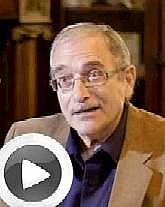
From the
Bard to Barnet
On the
exact 400th anniversary of Shakespeare's death
How Shakespeare
Wrote My Book
even though
he died Apr 23, 1616
and How What He Said about
Love, Art, Faith, and Death
Can Guide Us Today
As a follow-up to the popular Valentine's Day talk
on Shakespeare,
the Library has invited Vern to present another
program
April 23 Saturday 2 pm
Kansas City Public Library - Westport Branch
118 Westport Road, Kansas City, MO 64111, 816-701-3488
LINK
TO LIBRARY ANNOUNCEMENT
LOCAL
ACTORS and OTHERS
Rarely does a poet imitate
Shakespeare’s 154 sonnets with a book of his own, but local author Vern
Barnet has done just that with his Thanks for Noticing: The Interpretation
of Desire. Barnet honors Shakespeare by showing how the Bard’s concerns
about love, art, faith, and mortality shaped his own sonnets, and how Shakespeare’s
wisdom can guide our own lives. Local actors’
readings of some of the new sonnets will be featured.
Vern Barnet studied with U.S. Poet Laureate
and Pulitzer Prize winner Karl Shapiro at the University of Nebraska before
completing his doctoral studies at the University of Chicago. In addition
to The Star, his essays, reviews, and poems have been published in the
National Catholic Reporter, the Chicago Literary Review, and various religious
magazines and literary journals. He was one of the editors for the 740-page
reference book, The Essential Guide to Religious Traditions and Spirituality
for Health Care Providers (2013). He founded the Greater Kansas
City Interfaith Council in 1989 and remains active in interfaith work.
He has taught at area seminaries, is a frequent lecturer at area churches,
and has appeared on local and national radio and television.
Vern says: The point of the talk title's
hyperbole is this: Except for Shakespeare, my book would never have appeared.
First, he defined the sonnet form in English into which I have
poured my mind and heart.
Second, studying how he varied the internal structures of the
exterior ababccdefefgg inambc pentameter
form encouraged me to find
different ways of presenting my theme.
Third, most of his sonnets are addressed to a fair young man,
and the fact that the greatest sonneteer in English so disrupted the sonnet
tradition with so many extravagant sonnets in such a prolonged sequence
of same-sex affection emboldened me to write in a similar vein.
Fourth, while Shakespeare does continue the then 300-year old
sonnet tradition of examining the full range of emotions of love, from
exaltation to dispair, the psychological and spiritual depth of his accounts,
and the ambiguity and complexity of moments in an intimate relationship
have never been surpassed. I tried to model my sonnets on the raw honesty
of his work within the artistic integrity of his form.
Fifth, implicit in the sonnets is a working out of moral and
spiritual standards, explicitly, for example, in Sonnet 105, and his identification
of the beloved with the divine, while within the sonnet tradition, is raised
to a new level. It is to that level that I also aspire, as in my Sonnet
128.
Sixth, no one has better united the themes of mortaiity, love,
and art than the Bard, and I would like to claim his uniting energy flowed,
however imperfectly, into my work.
Seventh, several of my sonnets are specifically indebted to
his. Instances include his 73 and my 30.
Eighth, Shakespeare worries that a rival poet is stealing his
beloved, as Sonnet 80; learning from his experience, I perhaps try to do
better when a third party enters the scene, as my 58.
Ninth, as most
of Shakespeare's sonnets are framed so that the feeling and logic apply
to both same-sex and different-sex lovers, so most of mine are more about
emotions not specific to the genders of the parties involved.
Tenth, the historical evidence suggests that Shakespeare did
not authorize the publication of the 1609 Sonnets, and perhaps I
have learned from his unintentional success over the centuries that I might
dare deliberately to write openly in his shadow.
Eleventh, Shakespeare
wrote before Twitter and Facebook; if you wanted to "friend" someone in
Elizabehan England, or show off your literary skill, you might well have
written a sonnet. But the sonnet-writing fashion was out of style even
before Shakespeare's Sonnets were published, and sonnets in such
vein have never been in fashion again. (Elizabeth Barrett Browning's slender
44 Sonnets from the Portuguese [1850] -- using the Petrarchan, rather
than the Shakespearean sonnet form -- were written of married love.) Only
because Shakespeare did it did I write to and about my friends as I have.
Twelfth, there is no particular reason for a collection of sonnets
to number 154 except to acknowledge Shakespeare's Sonnets.
This event anticipates the Library's upcoming exhibit,
First
Folio! The Book That Gave Us Shakespeare, on tour from the Folger Shakespeare
Library.
For advanced
reading:
Borrow from the library or purchase on line
Vern Barnet: Thanks for Noticing: The Interpretation of Desire
Helen
Vendler: The Art of Shakespeare's Sonnets
Stephen Booth, editor: Shakespeare’s Sonnets
This program is a contribution to the Library's
Show
Me Shakespeare 2016 series, 400 years after the Bard's death.
Here is an image of the Library's poster announcing
the program:
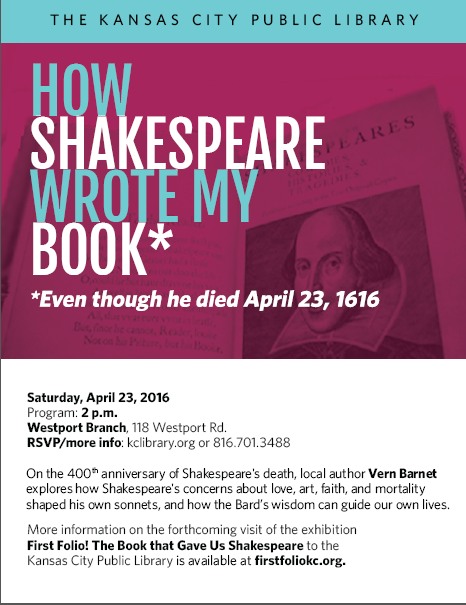
Here is a display at the library promoting my book
and the program
(one of the two library copies of my book was borrowed,
the other displayed here when I took the photo).
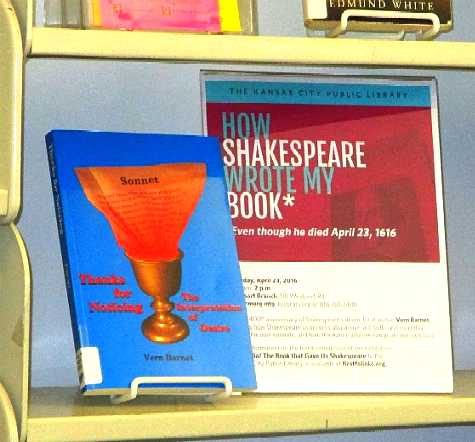
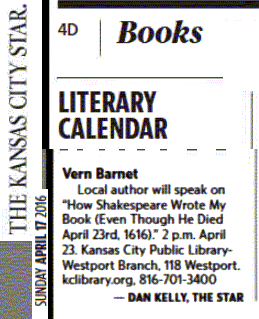
 Noted also at KC
Arts Beat on Facebook
Noted also at KC
Arts Beat on Facebook
IN THE STAR'S PRINT EDITION 2016 April 22, page
3C
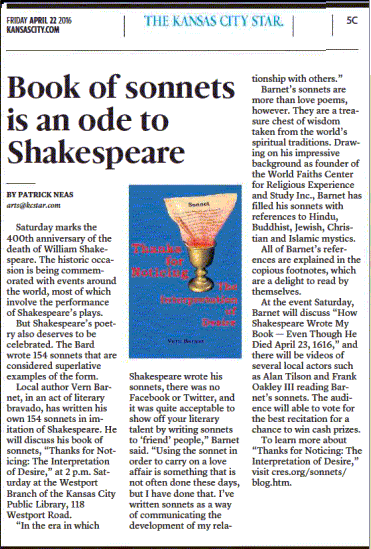
ON-LINE TEXT
HIGHLIGHTS
Local author Vern Barnet to discuss
Shakespeare and his sonnets Saturday at Westport library
BY PATRICK NEAS
arts@kcstar.com
* April
23 marks the 400th anniversary of the death of William Shakespeare
*
Barnet, in an act of literary bravado, has written his own 154 sonnets
in imitation of Shakespeare
*
Barnet’s sonnets are a treasure chest of wisdom taken from the world’s
religious and spiritual traditions
April 23
marks the 400th anniversary of the death of William Shakespeare. The momentous
historic event is being commemorated with events around the world, most
of which involve the performance of Shakespeare’s plays.
But Shakespeare’s
poetry also deserves to be celebrated. The Bard wrote 154 sonnets, which
are considered superlative examples of the form.
Local
author Vern Barnet, in an act of literary bravado, has written his own
154 sonnets in imitation of Shakespeare. He will discuss his book of sonnets,
“Thanks for Noticing: The Interpretation of Desire,” at 2 p.m. Saturday
at the Westport Branch of the Kansas City Public Library, 118 Westport
Road.
“In the
era in which Shakespeare wrote his sonnets, there was no Facebook or Twitter,
and it was quite acceptable to show off your literary talent by writing
sonnets to ‘friend’ people,” Barnet said. “Using the sonnet in order to
carry on a love affair is something that is not often done these days,
but I have done that. I’ve written sonnets as a way of communicating the
development of my relationship with others.”
Barnet’s
sonnets are more than mere love poems, however. They are a treasure chest
of wisdom taken from the world’s religious and spiritual traditions. Drawing
on his impressive background as founder of the World Faiths Center for
Religious Experience and Study Inc., Barnet has filled his sonnets with
references to Hindu, Buddhist, Jewish, Christian and Islamic mystics. All
of Barnet’s references are explained in the copious footnotes, which are
a delight to read by themselves.
At the event
Saturday, Barnet will discuss “How Shakespeare Wrote My Book — Even though
He Died April 23, 1616” and there will be videos of several local actors
such as Alan Tilson and Frank Oakley III reading Barnet’s sonnets. The
audience will able to vote for the best recitation for a chance to win
cash prizes.
To learn
more about “Thanks for Noticing: The Interpretation of Desire,” visit cres.org/sonnets/blog.htm.
RESPONSE TO CALL FOR ACTORS

Thanks to professional and amateur actors for reading
sonnets for videotaping March 30 and 31, and to the staff of the Kansas
City Public Library, Westport Branch for their assistance. We are particularly
grateful to our professional videographer Bill Pryor, who volunteered his
time. Since he was unable to return Thursday, we used a FlipCamera which,
while of inferior quality, still captured the high quality of the readings.
We expect all videos to appear on YouTube, and some will be selected for
the April 23 program. And thanks to our scheduler and advisor, Jamie Rich.
| WEDNEDAY READERS
Geneva Blackmer 16
John Gregory 88
Ryan Gates 25 29 55 82 93 124
Philip Hooser 58
Jon Michael Johnson 14 58 88
Mark Matzeder 16 39
Christopher Morgan 39 101
Michael McQuary 15 99
Neal L McGregor 65 88
Jamie Rich 146
Alan Tilson 14 30 124
|
THURSDAY READERS
Rozanne Devine 99 135
140 141 152
Sergio Moreno 58 63
M K Mustard 16 124
92
Anna Oakley 14 30
Frank Oakley III 88 104 15
Coyote Schaaf 82 88
Jesse Schaaf 93 104
Gabriella Sonnenschein 88 16
|
BOLDED Sonnet # = # of readers are
part of the Apr 23 contest.
| 14=3 |
29=1 |
58=3 |
88=6 |
101=1 |
140=1 |
| 15=2 |
30=2 |
63=1 |
92=1 |
104=2 |
141=1 |
| 16=4 |
39=2 |
65=1 |
93=2 |
124=3 |
146=2 |
| 25=1 |
55=1 |
82=2 |
99=2 |
135=1 |
152=1 |
CLICK HERE FOR THE VIDEOS
NOTICES AND
NEWS RELEASES for APR 23
FOR IMMEDIATE
RELEASE
Observing
the
The 400th Anniversary
of Shakespeare’s Death
at the Westport
Library
Contacts:
* Megan Garrett,
Kansas City Public Library – Westport Branch, 816.701.3488
* Jamie Rich,
promotions, 816 931 1189; info@opencircleonline.com
* Vern Barnet,
author, 816 753 1633; vern@cres.org
Web announcements;
* http://www.kclibrary.org/event/how-shakespeare-wrote-my-book
* http://www.cres.org/sonnets/blog.htm#events
Same-sex
love poems of Shakespeare paralleled in book by founder of Kansas City
Interfaith Council
April
23 also often observed as Shakespeare’s birthday (actual date unknown)
The Kansas City
Public Library — Westport Branch will observe the 400th anniversary of
Shakespeare’s death Saturday, April 23 at 2 pm with a program by Vern Barnet,
“How Shakespeare Wrote My Book — Even though He Died April 23, 1616.”
“Vern’s program for Valentine’s Day was so popular we are glad to have
him back for this auspicious anniversary,” said Megan Garrett, Westport
Branch manager.
Rarely does
a poet imitate Shakespeare’s 154 sonnets with a book of his own, but local
author Vern Barnet has done just that with his Thanks for Noticing: The
Interpretation of Desire. Barnet will discuss the sonnet form as part of
a tradition of love poetry already nearly four centuries old when it was
perfected in English by Shakespeare. The Bard’s concerns about love, art,
faith, and mortality inspired Barnet’s own 154 sonnets, many of which parallel
Shakespeare’s written to a fair young man. Local actors’ readings of some
of the new sonnets will be featured.
Vern Barnet
studied with U.S. Poet Laureate and Pulitzer Prize winner Karl Shapiro
at the University of Nebraska before completing his doctoral studies at
the University of Chicago.
In addition to a weekly column for The Kansas City Star 1994-2012, his
essays, reviews, and poems have been published in the National Catholic
Reporter, The Chicago Literary Review, and various religious magazines
and literary journals. He was one of the editors for the 740-page reference
book, The Essential Guide to Religious Traditions and Spirituality for
Health Care Providers (2013).
He founded the Greater Kansas City Interfaith Council in 1989 and remains
active in interfaith work. He has taught at area seminaries, is a frequent
lecturer, and has appeared on local and national radio and television.
Biographical information and photos appear at
http://www.cres.org/team/vern.htm
and at
https://en.wikipedia.org/wiki/Vern_Barnet
Praise for Thanks
For Noticing includes the following:
“Ride along
into frank considerations of sexuality, desire, love, and spirituality.
The ride will leave you breathless, spent.” —Bill Tammeus, past president
of the National Society of Newspaper Columnists
Barnet “toils
in an age-old tradition of spiritual gurus who delighted in the flesh as
they sang divine praise. . . . [This book] belongs at bedside, each sonnet
to be savored and explored, slowly – lover at your side.” —Tom Fox,
publisher, National Catholic Reporter
If Shakespeare,
“the English Bard, is in these sonnets spiritually, so also is the American
Bard, Walt Whitman.” —The Rev Mark E. Hoelter, formerly with the InterFaith
Conference of Metropolitan Washington, DC
Barnet “uses
his knowledge of world religions to advance discussions, even of controversial
areas, including the powerful emotions of love and spirituality.” —Alvin
L. Brooks, former City Councilman and Mayor Pro Tem
###
HOW SHAKESPEARE
WROTE MY BOOK
Even though
He Died April 23, 1616
Free program
by Vern Barnet
This Saturday
2 pm
Westport Library
118 Westport
Rd
Dear Friends--
This Saturday
marks the 400th anniversary of Shakespeare's death. His sonnets are immortal.
I don't claim that I "channeled" Shakespeare, though my website http://www.vernbarnet.com/
does list 12 ways his encounters with love shaped my book. Videos of professional
and amateur actors accent the program as they read for cash prizes from
my Thanks for Noticing: The Interpretation of Desire.
Vern Barnet
FULL NEWS RELEASE
AT http://www.cres.org/sonnets/blog.htm#160423PR
HOW SHAKESPEARE WROTE
MY BOOK
Even though He Died April
23, 1616
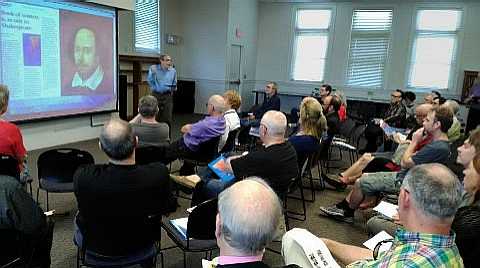
I'll have a fuller account of my talk here in a
few days. Congratulations to the winners of the videotaped sonnet reading
competition!
All videos are now on
YouTube.
Non-Duality
A conversation after church
recently led me to reflect on "non-duality." Buddhists much prefer to speak
about the "not-two" rather than the One, but some Western mystics mean
the same thing. I worry about a facile use of "unity" because it too easily
becomes "uniformity."
My sonnets are often hard
work, though I believe the reward is there. The sonnets in the Credo section
are complex, but the one that is perhaps most accessible in presenting
a non-dualistic perspective is 86
Interbeing. Of
the love sonnets, perhaps the conclusion of 24
Passage points to a process which is non-dual
in its nature and embrace. One of the sonnets employing scientific references
that even ends with the word "Whole" is 45
Husam . . . . And a far more controversial
way of approaching non-duality is the sexual language of 130
Your Choice, which makes it clear (I hope)
by rhetorical question, that both are true.
In my opinion the supreme
story explicating "entering the Gate of the Not-Two" is the Vimalakirti
Sutra. Any religious path, when it becomes an ideology, defeats itself,
becomes, to use a current word, a "trap." It is, in my opinion, the narcissism
of the spiritual seekers of the 60s that led to the sorry results from
that promising time; there was little understanding of "the Body of Christ."
One reason I like some forms of Buddhism is that, in them, Buddhism constantly
subverts itself. Below is a more compressed meditation from the Diamond
Sutra as rendered by R D Laing.
The Anthem (music by William
Mathias) from Julian of Norwich in this morning's service found several
ways of pointing to non-duality: "As truly God is our Father so just as
truly he is our Mother," with a progression of thought toward the Unity
in the Trinity. And of course the penultimate line, the theme of my book
(subtitled The Interpretation of Desire), which she words so beautifully:
"It is I who teach you to desire. It is I who am the reward of all true
desiring."
From Knots by R D Laing,
1970
“Although innumerable beings
Have been led to Nirvana
no being has been led
to Nirvana” --Diamond Sutra
Before one goes through the
gate
one may not be aware there
is a gate
One may think there is a
gate to go through
and look a long time for
it
without finding it
One may find it and
it may not open
If it opens one may be through
it
As one goes through it
one sees that the gate one
went through
was the self that went through
it
no one went through a gate
there was no gate to go through
no one ever found a gate
no one ever realized there
was never a gate
|
Varied
Audiences
A friend at a recent
alumni function asked me, "What's new?" and I told her I have written a
new book. Her face lit up with excitement and pleasure. "What is it?" she
asked. I started to reply "It's a book of sonnets . . ." when immediately
I saw her face change to disappointment and perhaps even pity. "Yes," I
said, "not a lot of people clamoring for sonnets."
I have laughed many times
since about this. Her warmth and regard for me was clear; and what I imagine
her assessment to be of the likelihood of me finding wide readership, alas,
is no doubt accurate.
To this insight I might add
my own experience that it is easier to "sell" the book, at least to friends,
than it is to coax them to read it. Even with all the explanatory material
(which Shakespeare did not provide for his sonnets!) the book is daunting;
and even though I've said that most people find reading two or three sonnets
a day is a considerable pace, the book overwhelms many. I am sustained
by the extraordinary praise those who have actually made their way through
the book have bestowed upon it.
Perhaps my problem is like
those faced by classical musicians; the audience is there, but limited,
and the problem is to find it and expand it, or in my case, since my book
works on so many different arenas, to find the many niche audiences.
Although I've just begun "marketing"
the book, the different audiences to which I've spoken successfully have
been so different that each particular talk is distinctive, a different
focus. Here are examples for those with varied interests --
-
lovers of erotic literature
-
those interested in the psychology
of love and limerence
-
those interested in theology
and philosphy
-
those interested in Eucharistic
mysteries
-
those interested in world religions
-
those interested in mysticism
-
Shakespeare fans
-
poets and poetry readers, especially
those fascinated with the sonnet form and its 700-year heritage
-
those interested in LGBT studies
and and sexual variation
|
2016 July 17.-- Vern and a dozen other alert
Kansas City authors were invited to be listed at HometownREADS
for Kansas City.
Vern Barnet's
summer programs about his book
click on
date or scroll down for information
July 10 -- Shawnee Mission
Unitarian Universalist Church
July
11 -- Prospero's Books, with Beau Bledso and Matt Schwader
July 13,
20, 17 -- St Andrew's Episcopal Church
August
14, 21, 17, September 4 -- Grace and Holy Trinity Cathedral
_________________________________________________________________________________________________

2016 July 10 Sunday 10:30 am
The Interpretation
of Desire
Using one of the 154 sonnets in my new book, Thanks for Noticing,I'll
propose that choosing to love the world, even with all its evil, is salvation.
a sermon at the Shawnee
Mission Unitarian Universalist Church
9400 Pflumm Rd. Lenexa, KS 66215; 913-381-3336
____________________________________________________
2016
July 11
Monday 7 pm
Free
Prospero's Books
upstairs
1800 West 39th
St
Kansas City,
MO
The
Bard,
Barnet,
and
Beau
An evening
of sonnets
by William
Shakespeare
and by
Vern Barnet
read by
Matt Schwader
with music
by
Beau Bledsoe
Vern previews
the sonnets,
Matt Schwader
reads them,
and Beau offers
a musical context.
KC Star writer
Patrick Neas
introduces the evening.
|
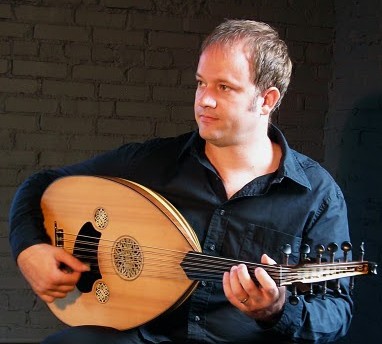
Beau Bledsoe
performs and records with some of the greatest artists in Tango, Flamenco
and classical music as he seeks to integrate different musical cultures
with diverse audiences. Beau has performed in almost every state in the
United States. In addition, Beau has toured extensively in Mexico, Argentina,
Portugal, Spain, Germany, France, Switzerland, Turkey and Russia. Kansas
Citians know him as a soloist and through groups like Bach Aria Soloists,
Owen/Cox Dance Group, and the Kansas City Ballet.

Matt Schwader
relocated to Kansas City, MO in February 2016, having previously lived
and worked as an actor, voice over talent, director, teacher, and acting
coach in Chicago since 1990. This past January, he taught a Shakespeare
Workshop in Seatttle and served as the verse coach for a production there
of Romeo and Juliet. Immersed in Shakespeare, he has played from
Stratford-upon-Avon to Mozambique, and performed in contemporary drama
as well.
|
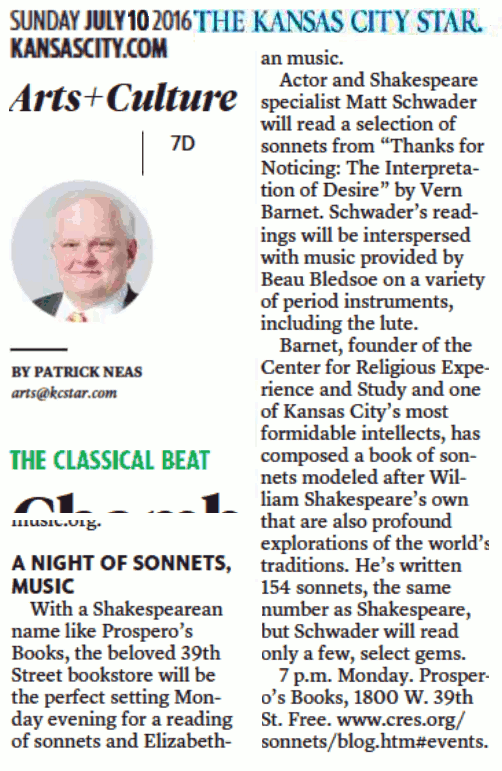
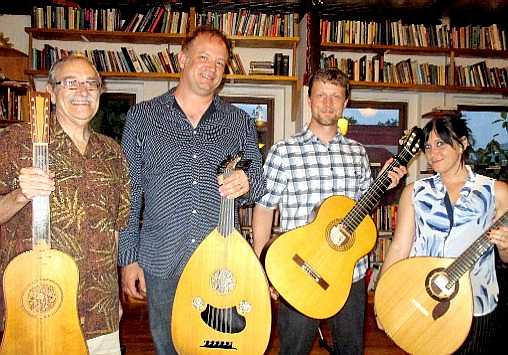
Vern, Beau, Matt, Geneva holding instruments on
which Beau performed.
It was a magical
evening at Prospero's Books.
Will Leatham welcomed the crowd, Patrick
Neas introduced the performers, Beau Bledsoe provided musical
context, Vern Barnet introduced a sonnet, Matt Schwader read
it, and the process was repeated. Geneva Blackmer read one sonnet,
Al
Brooks spoke from his experience, and David Nelson explained
his practices of reading one sonnet from Vern's book each day.
__________________________________________________

2016 July 13, 20, 27 --
three Wednesdays 6:30-7:30 pm
In cooperation with the Heart
of America Shakespeare Festival
Shakespeare’s
Sonnets, You, and Me
a series at St
Andrew's Episcopal Church
6401 Wornall Terrace, Kansas City, MO 64113; 816-523-1602
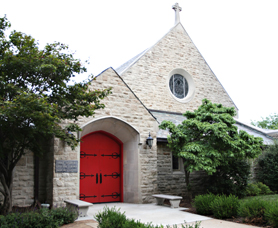
July 13 What Shakespeare's Sonnets Say
About Love
July 20 From the Bard to Barnet
July 27 How to Write a Sonnet (in 140 Easy Steps)
July 13 What Do Shakespeare's Sonnets
Say About Love? -- To whom did Shakespeare write his sonnets? Beginning
with infatuation, and ranging through despair, jealousy, deceit, and
co-dependence, do they ever reach maturity? Does Shakespeare identify love
with God? Why are there over 300 YouTube videos of Sonnet 116?
July 20 From the Bard to Barnet
-- Vern will explore three of at least twelve similarities between Shakespeare's
154 sonnets and his own 154 in his new book, Thanks For Noticing: The Interpretation
of Desire. How might these two sets of sonnets disclose our cardinal desires
and deepen our faith?
July 27 How to Write a Sonnet (in
140 Easy Steps) -- The externals of the English sonnet form are easy
to describe, but more interesting are the three or four common internal
logical structures that can be compared with the progress of prayer. In
one hour, you may not be able to finish writing a sonnet, but you'll get
a good start.
BOOKLIST
The KC Public Library has copies
of these books, including mine.
Helen Vendler:
The
Art of Shakespeare's Sonnets
Stephen Booth,
editor: Shakespeare’s Sonnets
William Shakespeare,
Oscar Wilde, Edward Hubler: The Riddle of Shakespeare's Sonnets
Vern Barnet: Thanks
for Noticing: The Interpretation of Desire
BIO-SKETCH
Vern Barnet writes
each month for the diocesan magazine, Spirit. He studied with U.S. Poet
Laureate and Pulitzer Prize winner Karl Shapiro and completed his doctoral
studies at the University of Chicago and the affiliated Unitarian Universalist
seminary. He wrote a weekly column on religion for The Kansas City Star,
1994-2012. His essays, reviews, and poems have appeared in the National
Catholic Reporter, the Chicago Literary Review, various religious magazines,
and literary journals. He was one of the editors of the 740-page reference
book, The Essential Guide to Religious Traditions and Spirituality for
Health Care Providers (2013). He founded the Greater Kansas City
Interfaith Council in 1989. He is a member of Grace and Holy Trinity Cathedral.
His book of sonnets was published in 2015.
___________________________________________________
Dean's Forum
August 14, August 21, August 28, September 4
Four Sundays 9:15-10 am
The Interpretation
of Desire
Common Room, Grace and
Holy Trinity Cathedral
13th and Broadway, Kansas City, MO; 816-474-8260

Vern Barnet presents questions raised by
his new book, Thanks for Noticing, four Sunday mornings. Rooted
in seven centuries of the sonnet tradition, the book explores how forms
of sexuality and spirituality are intimately related.
At a table where all faiths
are welcome, the chalice of the sonnet may offer refreshment for our Christian
paths. The sonnets are arranged by parts of the Mass, and the class will
discuss selected sonnets from at least four sections of the book.
Information about the
book, including YouTube videos by members of the Cathedral, can be accessed
by visiting VernBarnet.com. This site also contains an interview
with Vern outlining a "Medieval-Postmodern Theology" that underlines the
book.
Aug 14 - Credo - What is Truth?
Aug 21 - Confiteor - How Can I, Full of
Sin and Grace, Love Others?
Aug 28 - Sanctus - Is God in Sexual Expression?
Sept 4 - Dismissal - What do Youth, Age,
and Death Mean?
The book may be purchased at the Cathedral
Bookstore, at Prospero's
Books, at the Rime Buddhist Center
Bookshop, or on line through CRES. You
may also borrow copies through the Kansas
City Public Library.
_________________________________________________________
My Debt to Muslim
Poetry

Oct 15 Saturday
Brunch
Dialogue
Institute of Southwest
2710 S 42,
Kansas City, KS 6610
Vern discusses
how Rumi and other Muslim poets influenced his book of sonnets, Thanks
for Noticing: The Interpretation of Desire.
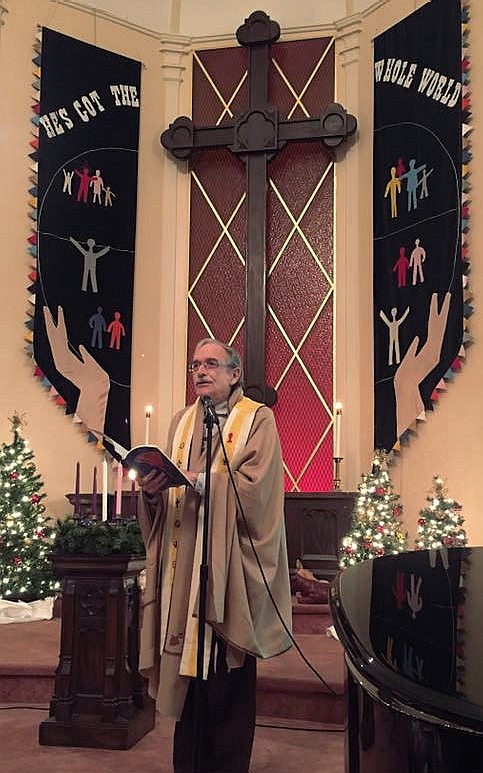
Vern was invited to select a sonnet from Thanks
for Noticing to read for World AIDS Day candlelight vigil and
service at Zion UCC - St. Joseph, MO. He selected "Sonnet 14 Ad Astra"
which begins, "In my frail frame immortal love doth dwell . . . ." Thanks
to the Rev Kimi Yokoyama for the beautiful and meaningful occasion.
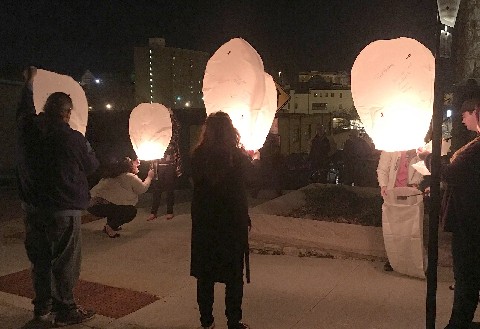
Thanks to the Reverend Josh Paszkiewicz (the Venerable
Sunyananda Dharma)
for the photos.
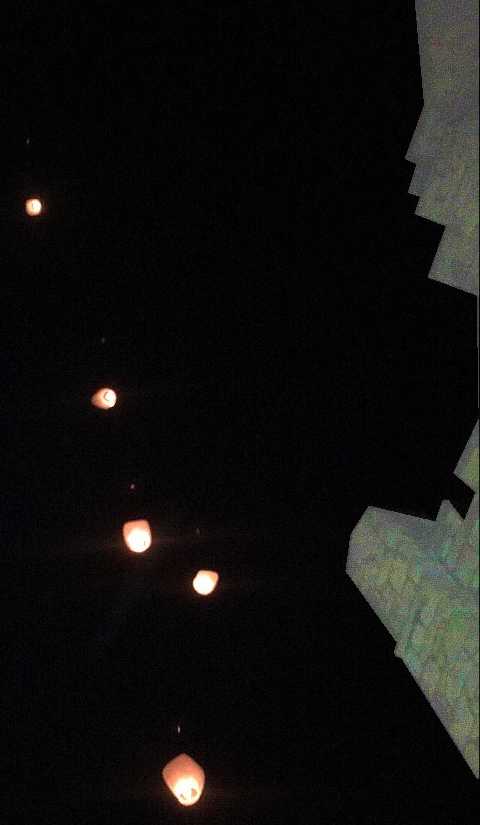
|
Thanks to a Friend
I am very grateful for your efforts to get my book
noticed! As far as bookstores go, I'd be happy to have it stocked without
any consignment agreement -- ie, I'd be happy to give several copies of
the book to the store -- at least initially, so they can see if it would
sell; if not, they can toss them in the trash, no need to return them.
I know the "market" for poetry is quite small, and
much smaller for the difficult stuff in my book, with its "baroque" arrangement.
And the percentage of LGBT folks who might be interested at this point
must be nearly infinitesimal. While the book may be profoundly rewarding,
it often appears dense.
I am surprised by the number of people who have
never read Shakespeare's 154 sonnets, and my name is not quite as well
known as his (!), so that also helps me keep perspective. I am sustained
by the comments from knowledgeable acquaintances and the continuing invitations
to speak, with opportunities they give me to sell a few at a time.
I am really surprised by the depth of questions
the book arouses -- especially in making new presentations to different
audiences. So I am working on a Study Guide to accompany the book itself.
Of course I am terribly exited about having selected sonnets of mine performed
as part of a Candlemas professional musical performance of Wm Byrd's
Mass for Four Parts.
Walt Whitman himselfpaid to have his 800 copies
of the first edition of Leaves of Grass printed, and it took a while
before it was noticed. I also take comfort that I have not lost friends
nor been disgraced as Whitman was. (See excerpt from Wikipedia below.)
On the other hand, if I could just be banned in Boston, as his book was,
generating publicity, I might be in my 10th printing by now!
So I really appreciate your help in trying to find
keys that will open the book to the attention it merits.
Excerpt from Wikipedia
| When the book was first published, Whitman
was fired from his job at the Department of the Interior after Secretary
of the Interior James Harlan read it and said he found it offensive. Poet
John Greenleaf Whittier was said to have thrown his 1855 edition into the
fire. Thomas Wentworth Higginson wrote, "It is no discredit to Walt Whitman
that he wrote Leaves of Grass, only that he did not burn it afterwards."
Critic Rufus Wilmot Griswold reviewed Leaves of Grass in the November 10,
1855, issue of |
The Criterion, calling it "a mass of
stupid filth" and categorized its author as a filthy free lover. Griswold
also suggested, in Latin, that Whitman was guilty of "that horrible sin
not to be mentioned among Christians", one of the earliest public accusations
of Whitman's homosexuality. Griswold's intensely negative review almost
caused the publication of the second edition to be suspended. Whitman included
the full review, including the innuendo, in a later edition of Leaves of
Grass. |
|
The
View from This Seat
Reflections about Life, Love, Light, and Liberty
(the 4-Ls) by Leroy Seat.
Barnet's Brilliant Book
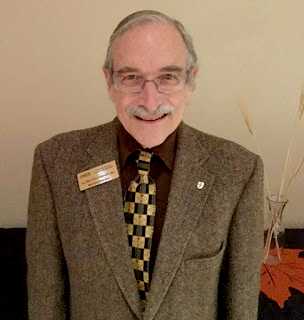 Vern
Barnet has long been one of the outstanding religious leaders of Kansas
City. The accompanying picture was taken of him at the 2016 Annual Interfaith
Community Thanksgiving Dinner, held for the first time on the campus of
William Jewell College. Vern
Barnet has long been one of the outstanding religious leaders of Kansas
City. The accompanying picture was taken of him at the 2016 Annual Interfaith
Community Thanksgiving Dinner, held for the first time on the campus of
William Jewell College.
The Barnet Award
At that most enjoyable gathering on Nov. 13, the
Vern Barnet Interfaith Service Award was given to Lama Chuck Stanford,
a retired Tibetan Buddhist leader who has long been active in Kansas City.
Barnet founded the Kansas City Interfaith Council
in 1989, and after his retirement as head of that organization, the Vern
Barnet Award was created in 2010—with him as its first recipient.
(Last year’s recipient of the award was my good
friend Ed Chasteen, former professor of sociology at William Jewell College.
June and I enjoyed sitting at the same table with Ed and his wife Bobbie
at last week’s Thanksgiving dinner.)
For many years Vern (b. 1942) served as a Universalist
Unitarian minister, and he is minister emeritus of the Center for Religious
Experience and Study (CRES), which he founded in 1982. In 2011, however,
he was baptized in an Episcopalian church, and is now said to be an active
Episcopalian layman.
His main love, though, still seems to be interfaith
activities.
The Barnet Book
Vern is also an editor and author. He co-edited
the 740-page Essential Guide to Religious Traditions and Spirituality
for Health Care Providers (2013). The most recent book he authored,
however, is not directly about religion.
Vern’s book Thanks for Noticing: The Interpretation
of Desire was published in 2015. He describes the book as a “prosimetrum
of 154 sonnets, glosses, and other commentary, in which the sacred beauty
of sex and love is explored.” (A prosimetrum is “a text composed in alternating
segments of prose and verse.”)
Vern’s sonnets are consciously linked to Shakespeare’s
154 sonnets. But, to be honest, I am over my head in trying to expound
upon the meaning and significance of either Shakespeare’s or Barnet’s sonnets.
But I have been moved by many of Vern’s sonnets I have read.
For full disclosure, I must admit that I have not
read nearly all of Vern’s book, although I do intend to keep reading it
little by little--which is the way it needs to be read. Thanks for Noticing
is
quite obviously a brilliant book as well as a very erudite one.
Barnet’s Sonnets 78 to 86
The 154 sonnets in Vern’s book are grouped into
eight sections with titles taken from the parts of a Catholic mass. The
most theological part is the one titled “Credo,” and those sonnets, numbers
78 to 86, are the ones to which I have paid the most attention.
(Many of the 154 sonnets are about sex and sexuality,
and I will leave it to others to write about the meaning and importance
of those.)
Sonnet 78 is titled “Advent,” and as next Sunday,
Nov. 27, is the first Sunday of Advent I have read and re-read that insightful
sonnet—although the Eucharist does not have the same meaning to me as it
does to Episcopalians or Catholics.
“Postmodern Faith: What is Truth?” is the title
of Sonnet 84, and it ends with this couplet:
I know the Gospel
is a pious tale,
But who cares facts when
worship cannot fail?
By these words Vern seems to urge us to a pre-modern/post-modern
“mysticism” that is not fettered by facticity. Direct experience of God
(Ultimate Reality) is more than, and far greater than, having (or seeking)
only factual knowledge.
That is one important lesson bundled in Barnet’s
brilliant book.
--
Leroy Seat, Ph.D
1307 Canterbury Ln
Liberty, MO 64068-3209
(816) 841-9586
Blog: http://TheViewFromThisSeat.blogspot.com
E-mail: LKSeat@gmail.com
Website: http://www.4-lministries.net/
Twitter: @LKSeat
|
TWO SPOOFS


CANDLEMAS
was the most elaborate program yet
featuring the book.
The report is so extensive, it is
not contained on this blog --
click
here.
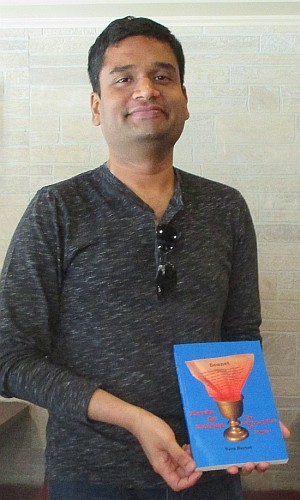 Although
we await the second printing -- with corrections -- of Thanks
for Noticing: The Interpretation of Desire, Vern presented one of the
few remaining copies of the first printing to Mohammed Shaik Hussain Ali,
producer of the film set in India, Evening Shadows, after a luncheon
meeting 2018 June 18. Ali, an observant Muslim, was interested in the religious
context for the sonnets, drawing on the Muslim tradition and many other
faiths. Although
we await the second printing -- with corrections -- of Thanks
for Noticing: The Interpretation of Desire, Vern presented one of the
few remaining copies of the first printing to Mohammed Shaik Hussain Ali,
producer of the film set in India, Evening Shadows, after a luncheon
meeting 2018 June 18. Ali, an observant Muslim, was interested in the religious
context for the sonnets, drawing on the Muslim tradition and many other
faiths.
Vern mentioned specifically
Ibn Arabi, the source of the subtitle for the book (Tarjuman al-Ashwaq).
Arabi was born in 1165
in Mercia, a reasonable journey from Seville, Spain, Kansas City's
first Sister City, celebrated by the small-scale reproduction of Giralda
Tower on the Country Club Plaza, thanks to developer JC Nichols. The original
structure in Seville was a minaret attached to an enormous mosque. The
minaret is large enough one can ride a horse up the inside ramp. The minaret
was replaced by the Cathedral after the Reconquista, with the belfrey
added by the Christians. Arabi, sometimes considered "the Greatest Sheikh"
by Sufis, is mentioned 20 times in the book.
|
HOW YOU CAN HELP
Here are some
ideas on how this book can be used to further the wholesome idea that sexuality
and spirituality are intimately related in the context of the world's religions,
and that the poetic form can chart the journey by which this truth can
be discovered. Please let me hear from you with other ideas -- email
-
vern@cres.org
--
Thank
you.
Vern Barnet
You can help
|
|














 One
of the delights of the occasion was the music of professional guitarist
and teacher Mac Childs who played from Elizabethan and other genres appropriate
to the book.
One
of the delights of the occasion was the music of professional guitarist
and teacher Mac Childs who played from Elizabethan and other genres appropriate
to the book.










 DAILY
PRACTICE
DAILY
PRACTICE VERN
ROMANTIC F***ER MYSTIC
VERN
ROMANTIC F***ER MYSTIC from
Comment added to YouTube video
from
Comment added to YouTube video
 PULITZER
PRIZE
PULITZER
PRIZE
 In
a note at the bottom of a poem he writes: “God’s playful delight is to
behold us, to know us as we are, beyond human moral criteria. Similarly,
when we love without need, intention, agenda, compulsion, claim, judgment,
or dependency, but simply love by noticing, by witnessing, by beholding,
loving freely as God does, we become like God. (Pg. 101)
In
a note at the bottom of a poem he writes: “God’s playful delight is to
behold us, to know us as we are, beyond human moral criteria. Similarly,
when we love without need, intention, agenda, compulsion, claim, judgment,
or dependency, but simply love by noticing, by witnessing, by beholding,
loving freely as God does, we become like God. (Pg. 101)
 Postal
receipt from mailing our first order from the United Kingdom.
Postal
receipt from mailing our first order from the United Kingdom.


















 Vern
Barnet has long been one of the outstanding religious leaders of Kansas
City. The accompanying picture was taken of him at the 2016 Annual Interfaith
Community Thanksgiving Dinner, held for the first time on the campus of
William Jewell College.
Vern
Barnet has long been one of the outstanding religious leaders of Kansas
City. The accompanying picture was taken of him at the 2016 Annual Interfaith
Community Thanksgiving Dinner, held for the first time on the campus of
William Jewell College.


 Although
we await the second printing -- with corrections -- of Thanks
for Noticing: The Interpretation of Desire, Vern presented one of the
few remaining copies of the first printing to Mohammed Shaik Hussain Ali,
producer of the film set in India, Evening Shadows, after a luncheon
meeting 2018 June 18. Ali, an observant Muslim, was interested in the religious
context for the sonnets, drawing on the Muslim tradition and many other
faiths.
Although
we await the second printing -- with corrections -- of Thanks
for Noticing: The Interpretation of Desire, Vern presented one of the
few remaining copies of the first printing to Mohammed Shaik Hussain Ali,
producer of the film set in India, Evening Shadows, after a luncheon
meeting 2018 June 18. Ali, an observant Muslim, was interested in the religious
context for the sonnets, drawing on the Muslim tradition and many other
faiths.